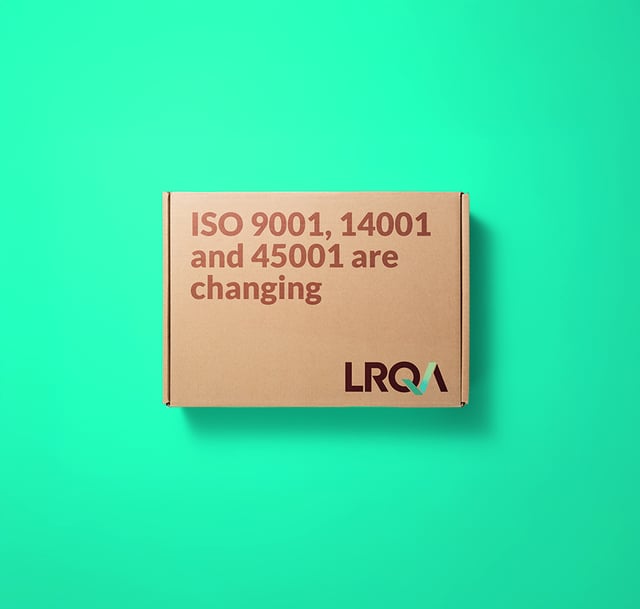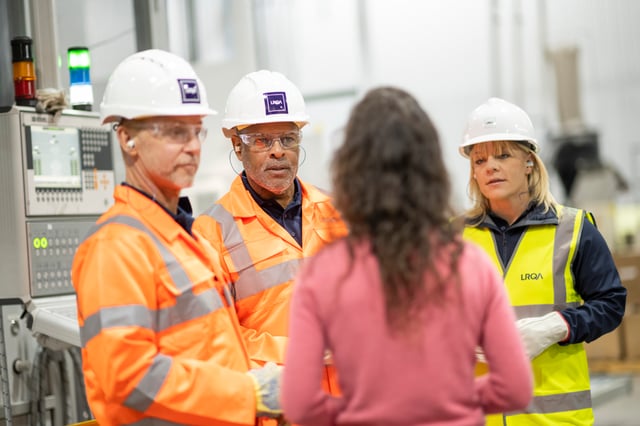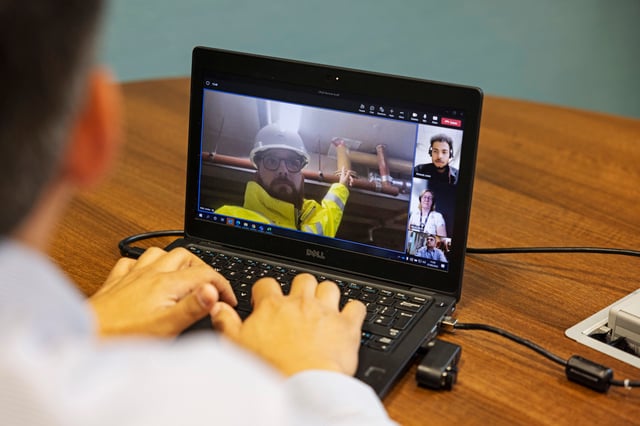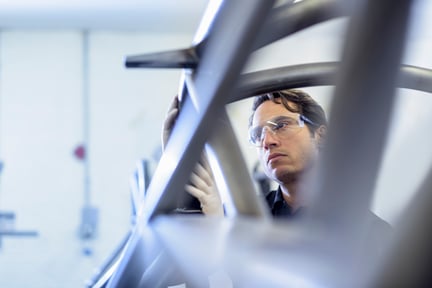
ISO 14001: Environmental Management Systems (EMS) Certification
A standards-based approach to managing your environmental risk
ISO 9001 and ISO 14001 DIS are live. ISO 45001 is next.
The world’s most recognised management system standards are being updated, with new requirements, new expectations and a formal transition period on the way. These changes matter.
ISO Transition Club: It's Free to Join
Are you ready to respond? Join our Transition Club.
LRQA is a market leader in ISO 14001 certification.
ISO 14001 encourages organisations to take a proactive approach to managing their environmental responsibilities by focusing on pollution prevention, legal compliance, and continuous improvement. By implementing an Environmental Management System (EMS) that meets ISO 14001 requirements, organisations can demonstrate a clear and ongoing commitment to reducing environmental risks, improving resource efficiency, and building long-term sustainability.
Achieving ISO 14001 certification not only strengthens stakeholder trust but also provides a structured framework for identifying environmental impacts, setting measurable objectives, and embedding sustainability into day-to-day operations. This internationally recognised standard has been updated to reflect the changing realities of climate change, global supply chain complexity, and growing regulatory requirements. These enhancements ensure that organisations are better equipped to respond to environmental challenges while remaining resilient, competitive, and aligned with modern expectations of corporate responsibility. Check out the Frequently Asked Questions for more information about ISO 14001 and our offerings.
Our ISO 14001 Certification Services
Our certification and training services can be delivered in an onsite, remote, or blended capacity – enabling you to tailor your service model to suit your business’s quality management needs.
Training
Expert-led ISO 14001 Training courses designed to build internal knowledge, improve system performance and support readiness for the 2026 revision.
Gap Analysis
An optional pre-audit review that highlights gaps in your current system and helps you prepare with confidence.
Certification
A globally recognised two-phase audit that builds trust, meets stakeholder expectations and drives continual improvement.
Integrated Audits
Combine ISO 14001 standard with other standards like ISO 9001 or ISO 45001 to join the dots and manage risk more efficiently.
Benefits of ISO 14001 Certification
Achieving ISO 14001 certification demonstrates a clear commitment to environmental responsibility and sustainable business practices. Certification from a globally recognised body such as LRQA gives customers, employees, and stakeholders confidence that environmental performance improvement is a genuine organisational priority.
- Environmental Compliance - ISO 14001 provides a structured framework to help organisations comply with environmental legislation. By adopting a systematic approach to identifying and addressing both current and future legal requirements, certification reduces the risk of non-compliance and helps businesses stay ahead of evolving regulations.
- Managing Environmental Risk - The standard supports improved performance in critical areas such as energy consumption, waste management, and the sourcing of raw materials. By proactively managing these areas, organisations reduce the likelihood of environmental incidents, clean-ups, litigation, and associated reputational damage. ISO 14001 certification provides evidence that environmental risks are being effectively managed and that continuous improvement against measurable targets is a core part of operations.
- Credibility and Competitive Advantage - Independent assessment against ISO 14001:2015 enhances credibility and sets certified businesses apart from competitors. Certification signals to customers, investors, and regulators that sustainability is taken seriously, often providing a decisive edge when competing for new contracts or market opportunities.
- Cost Reduction - Implementing ISO 14001 drives greater efficiency in the use of resources. By reducing energy consumption, minimising waste, and improving overall performance, organisations can achieve significant cost savings. The continual improvement cycle embedded in the standard ensures these benefits increase over time.
- Easy Integration with Other Standards - ISO 14001 follows the Annex SL framework, the high-level structure for modern ISO Standards. The Annex SL structure ensures consistency and compatibility between the different management system standards and allows for a straightforward and harmonised implementation of multiple standards (integrated management systems). ISO 14001 easily integrates with all new and revised ISO management system standards, such as ISO 9001 (Quality Management), ISO 45001 (Occupational Health and Safety), and ISO 27001 (Information Security).
ISO 14001 certification helps organisations demonstrate compliance, manage environmental risks, enhance credibility, reduce costs, and seamlessly integrate with other ISO standards—making it a valuable investment for businesses committed to long-term sustainability.
Why work with us?
Global reach, local support
With clients in over 150 countries and auditors on the ground wherever you operate, we deliver consistent, high-quality support. Our environmental auditors combine local knowledge with global best practice to support your ISO 14001 journey, wherever it takes you.

Flexible delivery
In most cases, our ISO 14001 training and certification services can be delivered onsite or remotely using safe and secure technology. If you opt for our remote delivery methods, you’ll receive the same high-quality service with several added benefits, including flexibility, fast delivery and access to global expertise.

Decades of expertise
LRQA was the first organisation to receive UKAS accreditation for delivering certification services across multiple standards. With decades of experience in environmental management, our auditors bring deep sector knowledge and proven insight to every engagement.

Focused on you
We don’t just audit; we help you improve. Our ISO 14001 solutions are tailored to your goals, whether that’s meeting stakeholder expectations, accessing new markets, or strengthening environmental performance. Every assessment is designed to add value and support your goals.

How to Get Certified: ISO 14001 Certification Process
The path to ISO 14001 certification depends on your organisation’s size, complexity, and the maturity of your existing environmental management practices. While every journey is unique, the certification process typically follows these stages:
- Getting Started
Build knowledge and prepare your organisation by developing awareness of ISO 14001 requirements. Many organisations choose to begin with training or implementation support to accelerate readiness. - Pre-Assessment (Optional)
A gap analysis or preliminary assessment can be carried out before the formal audits. This step helps identify areas for improvement and gives you the opportunity to address them in advance. - Stage 1 Audit – Documentation and Planning Review
Your auditor reviews the design and documentation of your Environmental Management System (EMS) to check alignment with ISO 14001 requirements. This is often conducted remotely and ensures you are ready for the next stage. - Stage 2 Audit – Implementation and Effectiveness Review
At this stage, the auditor evaluates how effectively your EMS is implemented across your organisation. They will assess compliance, review performance evidence, and confirm that continual improvement processes are in place. This assessment may be completed on-site or remotely. If no major nonconformities are identified, certification is recommended. - Certification Awarded
Successful organisations receive an ISO 14001 certificate, demonstrating commitment to internationally recognised best practices in environmental management. - Promote Your Certification
Certification can be a valuable differentiator. Many organisations highlight it in tenders, sustainability reporting, and stakeholder communications to build trust and win new opportunities. - Annual Surveillance Audits
To maintain certification, surveillance audits are carried out each year across the three-year cycle. These audits ensure your EMS continues to meet ISO 14001 requirements and support continual improvement. - Certificate Renewal
At the end of the three-year cycle, a recertification audit takes place (typically around three months before the certificate expiry). This ensures continuity and renewal of your ISO 14001 certification.
Ready to begin your ISO 14001 certification journey? Speak to our team to discuss the right approach for your organisation.
To make your preparation easier, you can download our ISO 14001 checklist, aligned with the standard’s key sections and designed to support internal reviews or pre-audit readiness.
Would you like to know more about ISO 14001 Certification?
Frequently Asked Questions
What is ISO 14001?
Providing a framework to meet the requirements of international standards for environmental management systems (EMS), ISO 14001 requires organisations to manage their environmental impact through a commitment to pollution prevention, legal compliance, and continual improvement.
Environmental Management System certification to the ISO 14001 standard helps organisations demonstrate a commitment to improving environmental performance. The standard has been comprehensively reviewed and updated to ensure that it supports changing organisational needs in today’s world and reflects the complex environment in which businesses operate.
What is an environmental management system?
An environmental management system (EMS) is a framework that an organisation can implement to measure and minimise the environmental impact that is caused or could be caused by its processes, operations and products/services.
What is the latest version of ISO 14001?
ISO 14001:2015 puts greater emphasis on proactively improving environmental performance and embeds environmental management within an organisation's strategic plans. It is suitable for organisations of any size and in any sector. LRQA's technical experts were part of the ISO technical committee that developed ISO 14001:2015, so can provide deep insights into the requirements and rationale of the standard.
How are ISO 14001 audits conducted?
Our services blend remote and on-site audits activities to provide unrivalled insight and expertise. Using secure, remote technology, we can provide a fast and flexible way to maintain your audit schedule, help reduce carbon footprint associated with travel, and minimise health and safety risks for people working on hazardous sites or hard-to-reach areas. Outcomes are consistent with on-site audits, so the integrity of your audit and accredited certification remains exactly the same.
How much does it cost to get ISO 14001 certified?
Certification costs will depend on the size and complexity of your organisation and the maturity of its existing management system.
What is the difference between ISO 9001 and ISO 14001?
ISO 14001 is the globally recognised standard which certifies environmental management systems, whereas ISO 9001 is the globally recognised standard which certifies a business’s quality management system (QMS). ISO 14001 and ISO 9001 both follow the Annex SL framework and can be easily integrated.
What are the ISO 14001 requirements?
Clauses 0 to 3: Introduction, Scope, References, Terms and Definitions
Clause 4: Context of the organisation
Clause 5: Leadership and commitment
Clause 6: Planning for the QMS
Clause 7: Support & resource management
Clause 8: Operational planning and control
Clause 9: Performance evaluation
Clause 10: Improvement actions
What’s happening with the ISO 14001 revision and how can I prepare?
ISO 14001 is currently under revision, with the Draft International Standard (DIS) now published. The final updated standard is expected in March 2026, which will mark the beginning of a three-year transition period for certified organisations.
To help you stay informed and prepare with confidence, we’ve launched the LRQA Transition Club, a free hub of resources, expert insight and practical guidance to support your transition planning.
Are you already certified to ISO 14001 and would like to transfer?
If you hold a valid accredited certificate of approval with another provider and you are considering making the move, transferring your ISO 14001 certification to LRQA is simple. We'll work with you to ensure your transfer is as smooth as possible.









